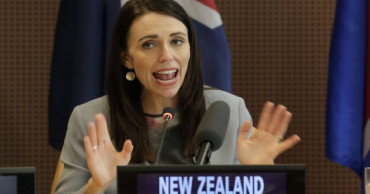Prime Minister Jacinda Ardern
Ardern, rival turn her hot-mic vulgarity into charity’s win
When New Zealand Prime Minister Jacinda Ardern was caught on a hot mic using a vulgarity against a rival politician last week, it seemed the nation’s political discourse could be taking an ugly turn heading into an election year.
But Ardern and her target, lawmaker David Seymour, agreed on a plan to make good. They both signed an official parliamentary transcript of Ardern’s comment and auctioned it for charity. The auction closed Thursday with a top bid of just over 100,000 New Zealand dollars ($63,000).
“Can’t say I expected this,” Ardern wrote on Facebook. “A faux pas with the old mic in parliament has turned into $100,100 for the Prostate Cancer Foundation. My thanks to David for being a good sport and to everyone who placed a bid.”
After five years as prime minister, Ardern faces a tough election campaign in 2023. Her liberal Labour Party won reelection two years ago in a landslide of historic proportions, but recent polls have put her party behind its conservative rivals.
Ardern’s comment had come after Seymour, who leads the libertarian ACT party, peppered Ardern with questions about her government’s record for around seven minutes during Parliament’s Question Time, which allows for spirited debate between rival parties.
After sitting down, Ardern, as an aside, said to her deputy “He’s such an arrogant pr———.” Her words were barely audible on Parliament TV but were just picked up in the background.
Ardern later sent an apologetic text to Seymour, who said he was “shocked and astonished” at her language, which was out of character. He said Ardern had said in her text that “as her mom said, if you don’t have anything nice to say, don’t say it.”
Seymour then suggested the auction idea to Ardern at an end-of-year party with journalists and Ardern agreed.
Read more: New Zealand to decide on lowering voting age from 18 to 16
The auction was held on the New Zealand website Trade Me and attracted more than 280 bids. It was billed as “Ardern, Seymour join forces for pr———s everywhere.”
Peter Dickens, the chief executive of the Prostate Cancer Foundation, said he wanted to thank both politicians for their “classy” reaction. He said the money comes as a huge boost after a hard year during which normal fundraising activities were curtailed by COVID-19.
“We’ve been overjoyed and amazed all the way through the journey of this auction,” Dickens said. “It’s made more than we ever could have imagined.”
He said the money, equivalent to 10% of its annual budget, would go to a range of services it offers, including free counseling and support groups.
Dickens said prostate cancer is the nation’s most diagnosed form of cancer and that older men should consider getting a simple blood test to enable early detection.
“Just a little prick could save a life,” he said.
3 years ago
New Zealand to decide on lowering voting age from 18 to 16
New Zealand lawmakers will take a vote on whether to lower the national voting age from 18 to 16, Prime Minister Jacinda Ardern said Monday.
Her announcement came hours after the country's Supreme Court ruled that not allowing 16- and 17-year-olds to vote amounted to age discrimination.
But while Ardern said she personally favors lowering the age, such a change would require a 75% supermajority of lawmakers to agree. And even proponents acknowledge they don't currently have the numbers.
A number of countries are debating whether to lower their voting age. Some that allow people to vote at 16 include Austria, Malta, Brazil, Cuba and Ecuador.
Sanat Singh, co-director of New Zealand's Make It 16 campaign, said he was absolutely thrilled with the court's decision.
Read more: Climate change in New Zealand to cause sperm, blue whales to seek higher latitudes
“It's a huge day,” he said. “This is historic not only for our campaign, but for the country.”
Singh, 18, said existential issues like climate change — as well as issues like pandemic recovery and the state of democracy — will most affect young people.
“That's why I think it's really important to get all hands on deck to make sure we can have a stronger future,” he said.
Ardern, who leads the liberal Labour Party, said all lawmakers should have a say on the issue.
“I personally support a decrease in the voting age but it is not a matter simply for me or even the government,” Ardern said. “Any change in electoral law of this nature requires 75% of parliamentarians' support.”
Ardern said the vote would likely take place within the coming months but any change would not take effect until after next year's general election.
The liberal Green Party said it supported a change.
“Young people deserve to have a say in the decisions that affect them, both now and in the future,” said Golriz Ghahraman, the party’s electoral reform spokesperson.
But New Zealand's two main conservative opposition parties said they oppose a change.
Read more: New Zealand welcomes back first cruise ship since COVID hit
“It's not something we support,” Opposition Leader Christopher Luxon told reporters. “Ultimately, you've got to draw the line somewhere, and we're comfortable with the line being 18.”
At the Supreme Court, four judges found in favor of the lobby group's appeal with a fifth judge dissenting to some aspects of the decision.
In New Zealand, the protection against age discrimination begins at 16, and the judges ruled that the attorney-general had failed to show why 18 had been chosen as the age to vote rather than 16.
The nature of the court’s ruling compelled New Zealand lawmakers to at least debate the issue, but it didn’t compel them to take a vote or to make a change.
Singh said he's hopeful that while his group may not yet have the 75% support it needs in Parliament, it will get there within the next few years. He said a possible first step would be to get the voting age lowered to 16 for local council elections, as that change requires only a regular majority of lawmakers.
New Zealand's voting age was previously lowered from 21 to 20 in 1969, and then to 18 in 1974.
3 years ago
Plans for movie on New Zealand mosque attacks draw criticism
Tentative plans for a movie that recounts the response of Prime Minister Jacinda Ardern to a gunman’s slaughter of Muslim worshippers drew criticism in New Zealand on Friday for not focusing on the victims of the attacks.
Hollywood news outlet Deadline reported that Australian actor Rose Byrne was set to play Ardern in the movie “They Are Us,” which was being shopped by New York-based FilmNation Entertainment to international buyers.
The movie would be set in the days after the 2019 attacks in which 51 people were killed at two Christchurch mosques.
Read:‘Conjuring 3’ tops ‘A Quiet Place 2’ as moviegoing returns
Deadline said the movie would follow Ardern’s response to the attacks and how people rallied behind her message of compassion and unity, and her successful call to ban the deadliest types of semiautomatic weapons.
The title of the movie comes from the words Ardern spoke in a landmark address soon after the attacks. At the time, Ardern was praised around the world for her response.
But many in New Zealand are raising concerns about the movie plans.
Aya Al-Umari, whose older brother Hussein was killed in the attacks, wrote on Twitter simply “Yeah nah,” a New Zealand phrase meaning “No.”
Abdigani Ali, a spokesperson for the Muslim Association of Canterbury, said the community recognized the story of the attacks needed to be told “but we would want to ensure that it’s done in an appropriate, authentic, and sensitive matter.”
Read:COVID-19 spurs shutdown of ‘Mission Impossible’ set
Tina Ngata, an author and advocate, was more blunt, tweeting that the slaughter of Muslims should not be the backdrop for a film about “white woman strength. COME ON.”
Ardern’s office said in a brief statement that the prime minister and her government have no involvement with the movie.
Deadline reported that New Zealander Andrew Niccol would write and direct the project and that the script was developed in consultation with several members of the mosques affected by the tragedy.
Niccol said the film wasn’t so much about the attacks but more the response.
“The film addresses our common humanity, which is why I think it will speak to people around the world,” Niccol told Deadline. “It is an example of how we should respond when there’s an attack on our fellow human beings.”
Read:Frances McDormand a double Oscar winner for 'Nomadland'
Byrne’s agents and FilmNation did not immediately respond to requests for comment. The report said the project would be filmed in New Zealand but did not say when.
Niccol is known for writing and directing “Gattaca” and writing “The Terminal” and “The Truman Show,” for which he was nominated for an Oscar.
Byrne is known for roles in “Spy” and “Bridesmaids.”
4 years ago
New Zealand's Ardern headed for landslide win and 2nd term
Prime Minister Jacinda Ardern was headed for a landslide win and a second term in office Saturday in New Zealand’s general election.
5 years ago
New Zealand begins lifting coronavirus restrictions
All remaining coronavirus restrictions will be lifted across much of New Zealand from late Monday except for Auckland, the largest city.
5 years ago
Coronavirus outbreak: New Zealand delays election
Prime Minister Jacinda Ardern has announced delaying New Zealand's elections by four weeks due to the coronavirus outbreak in Auckland.
5 years ago
New Zealand aims to eliminate virus
With most countries working on ways to contain the coronavirus, New Zealand has set itself a much more ambitious goal: eliminating it altogether.
5 years ago
New Zealand leader says nation changed after mosque attacks
Prime Minister Jacinda Ardern said Friday that New Zealanders have become more engaged with the Muslim community in the year since a gunman killed 51 people at two mosques.
5 years ago
New Zealand's Ardern seeking reelection in Sept. 19 vote
Prime Minister Jacinda Ardern may be lauded around the world as a liberal icon but whether she can translate that into a reelection victory in September remains uncertain.
6 years ago




.jpg)

.jpg)
.png)



